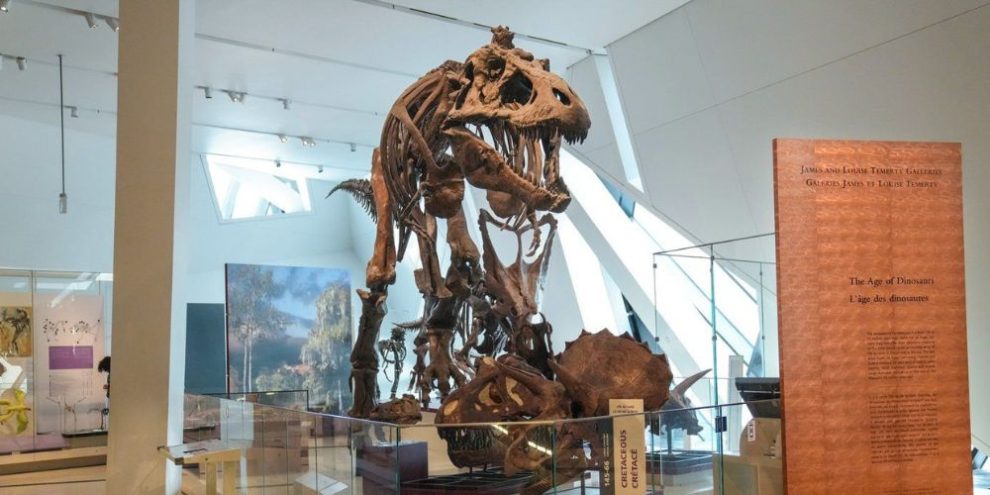
Bob Weber - The Canadian Press
Science recently proposed a truly horrifying thought — that T. Rex, perhaps the most fearsome predator to walk the earth, was also smart enough to use tools, hunt in packs and pass down knowledge.
Yikes.
But a new paper throws cold water on those dinosaur fever dreams.
"They were very bold claims that needed a second look," said Cristian Gutierrez, a University of Alberta neuroscientist and co-author of a paper in The Anatomical Record that takes a skeptical view of the intelligent Tyrannosaurus theory.
Suzana Herculano-Houzel of Vanderbilt University published research in 2023 that took data on the number of neurons in the brains of evolutionary descendants of some dinosaurs, such as modern birds, reptiles and turtles, and applied them to the fossilized brain cases of ancient lizards.
In the Journal of Comparative Neurology, she concluded T. Rex had somewhere between two and three billion neurons — equivalent to those in the brains of intelligent primates, such as baboons.
"(That) would make these animals not only giant but also long-lived and endowed with flexible cognition and thus even more magnificent predators than previously thought," she wrote.
Uh, no, said Gutierrez.
He writes that Herculano-Houzel significantly overestimated the size of the actual brain inside T. Rex skulls, which were much more closely related to modern crocodiles than birds. Croc brain cases contain a significant amount of fluid and non-brain tissue, with as little as 30 per cent given over to grey matter.
As well, bird brains are much more neuron-dense than reptile brains, further contradicting Herculano-Houzel's comparison.
Then there's body size. Even if a T. Rex brain held as many neurons as a baboon's or a magpie's, that brain had a lot more body to operate.
"It's clear larger animals need more neurons," Gutierrez said.
"A T. Rex had, let's say, two billion neurons — about the same as a baboon. But the T. Rex weighed seven tonnes and the baboon weighs 40 kilos.
"It's not the same, right?"
And besides, he said, more neurons don't necessarily mean more intelligence.
Giraffes have about two billion neurons but aren't known to use tools or pass down culture. Magpies, on the other hand, only have about 400 million neurons but play games and hold "funerals" for their dead.
Barrie's News Delivered To Your Inbox
By submitting this form, you are consenting to receive marketing emails from: Central Ontario Broadcasting, 431 Huronia Rd, Barrie, Ontario, CA, https://www.cobroadcasting.com. You can revoke your consent to receive emails at any time by using the SafeUnsubscribe® link, found at the bottom of every email. Emails are serviced by Constant Contact
In an email, Herculano-Houzel said the authors didn’t agree with her assumptions how dinosaur brains were structured.
"I argued, based on raw evidence on body and estimated brain size, that T. rex did scale like a warm-blooded modern ostrich," she said.
"I believe that the various lines of evidence provided in my original 2022 publication make a compelling case that T. rex was warm-blooded."
Gutierrez said his previous research has shown that there are correlations between behaviour, brain size and the size of different parts of the brain.
"They're not always straightforward correlations, but there are correlations. It's not completely crazy to look at the shape of the brain of the T. Rex."
He said dinosaurs more closely related to birds, such as the Jurassic-era archaeopteryx,had larger brains and may have had more complex, birdlike behaviour.
Fossils do provide some indications of how dinosaurs lived. They can show dinos tended their young and lived in groups, for example.
"But it's always going to be limited," Gutierrez said. "That's the one thing that isn't going to be fossilized — behaviour."
An intelligent T. Rex is highly unlikely, Gutierrez said. Tyrannosaurs probably had smarts closer to those of a crocodile than a primate, so rest easy.
If the thought of a seven-tonne crocodile lets you rest easy.
banner image: The Canadian Press





